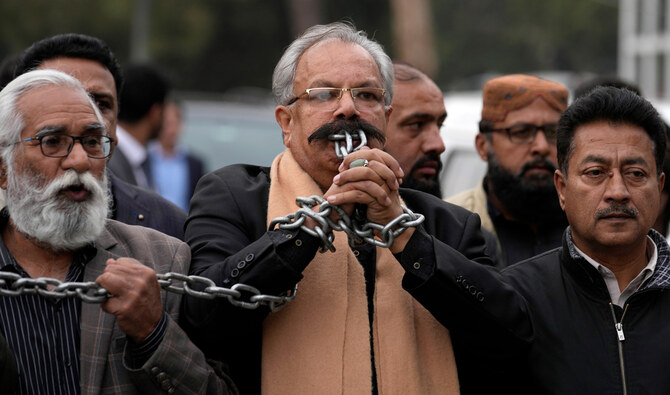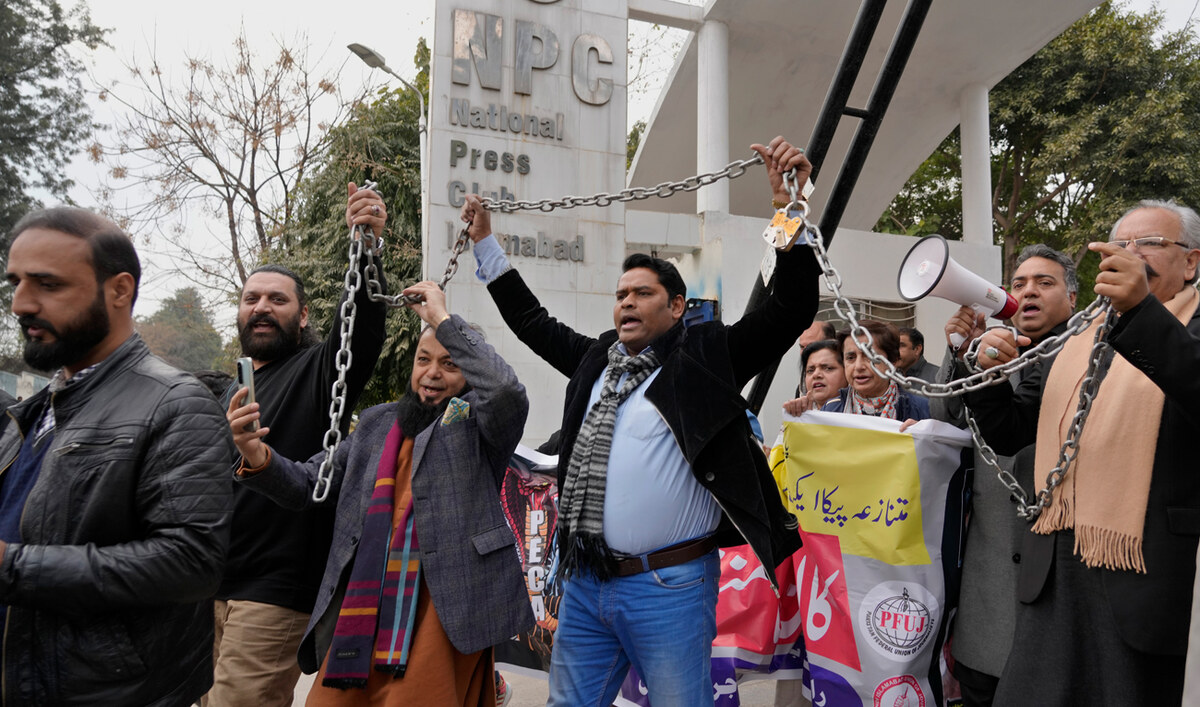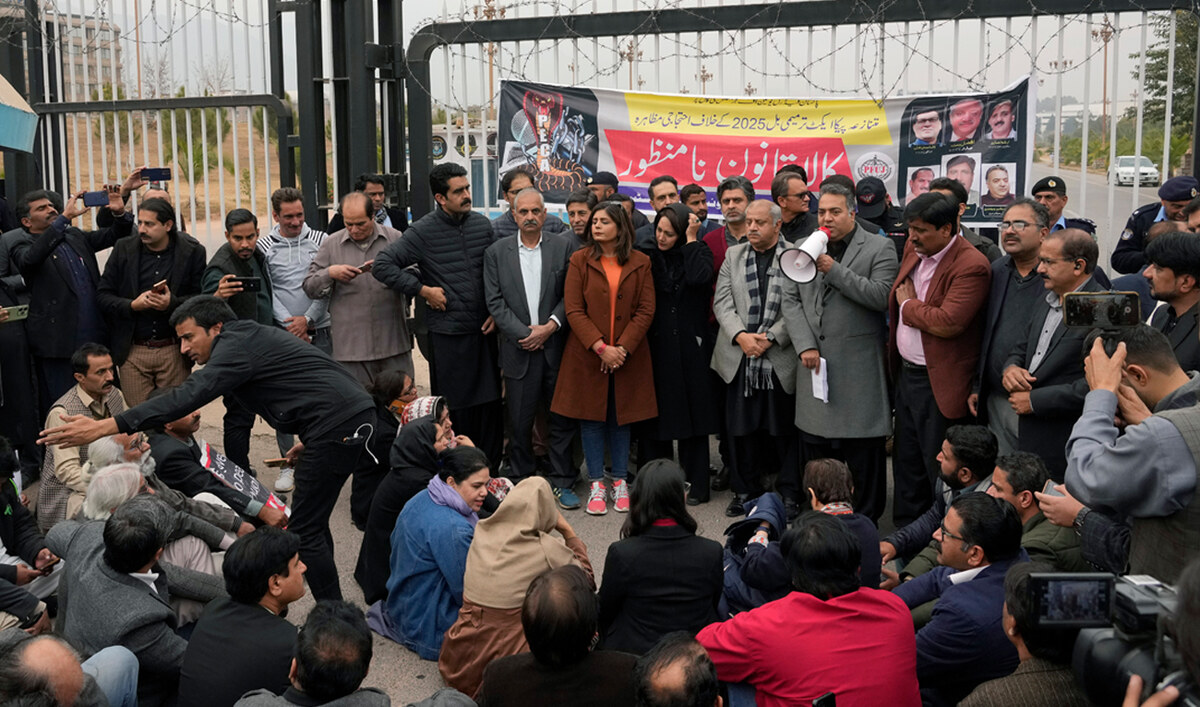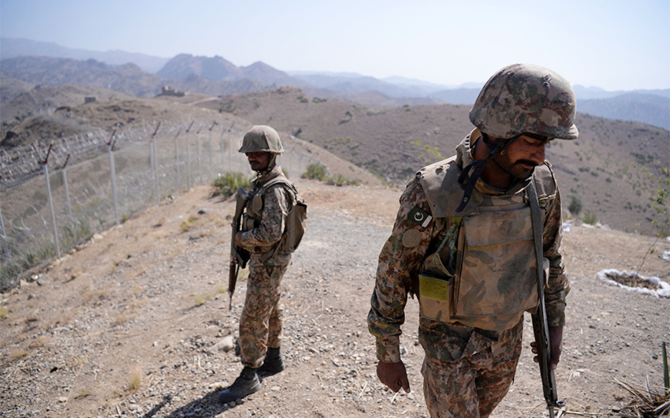PESHAWAR: Security forces raided a militant hideout in northwest Pakistan on Tuesday, triggering an intense shootout that killed two soldiers and three militants, the military said.
According to a military statement, security forces launched a search operation following the shootout in the district of Kurram in Khyber Pakhtunkhwa province, which borders Afghanistan.
It provided no further details, and the identity and nationality of the slain militants were not immediately known. Kurram, a former stronghold of the Pakistani Taliban, is located near the Afghan border.
Since 2017, Pakistan has been fencing the country’s northwestern regions along the border to contain the movement of militants and to curb smuggling and illegal border crossings. Pakistan says it has completed 91 percent of the fence along the 2,611-kilometer (1,622-mile) boundary with Afghanistan known as the Durand Line.
Shootout in northwest Pakistan leaves 2 soldiers, 3 militants dead
https://arab.news/682rb
Shootout in northwest Pakistan leaves 2 soldiers, 3 militants dead

- The incident happened when security forces launched a search operation following a shootout in Kurram district near Afghanistan
- Pakistan has been fencing its border with Afghanistan since 2017 to contain militant movement and curb smuggling
Pakistan says ‘long’ Hajj package under government scheme to cost $3,805

- Long and short Hajj packages prices to cost $3,847 and $4,124, respectively, religion ministry says
- Pakistan introduced 20-25 day duration Hajj program for pilgrims’ convenience for first time this year
ISLAMABAD: Pakistan’s religion ministry announced the final cost of the government’s long and short duration Hajj packages, saying that the former will cost Rs1,075,000 ($3,805) per head while the cost for the shorter duration has been set at Rs1,150,000 ($4,120).
Saudi Arabia has allocated a quota of 179,210 Hajj pilgrims for Pakistan in 2025, with an equal split between the government and private schemes. Pakistan last year set the same cost for Hajj 2024 under the government scheme.
Pakistan’s Ministry of Religious Affairs (MoRA) this month said the government had introduced a “shortened” Hajj program of 20 to 25 days for the first time which would make the journey easier and more accessible for Pakistani pilgrims. Pakistan’s Hajj Policy 2025 also allows pilgrims to pay for the pilgrimage in installments for the first time ever.
“The Ministry of Religious Affairs has announced the final Hajj package prices,” the religion ministry said. “The final price of the long Hajj package has been set at Rs10,75,000 while the short Hajj package has been set at Rs11,50,000.”
The statement added that the third installment of Hajj dues will be collected from Feb. 1-10.
It said limited seats were left for the government’s Hajj scheme, adding that its applications would be accepted until Jan. 30. The statement also mentioned that bookings for the short Hajj scheme had now been filled.
“New applications will be accepted on a first-come first-serve basis until Jan. 30,” it added. “Private Hajj pilgrims can continue booking until Jan. 31.”
The ministry also advised Hajj organizing companies to immediately upload the data of private pilgrims to the government’s e-portal.
The ministry has also launched the Pak Hajj 2025 mobile application, available for both Android and iPhone users, to guide pilgrims. Additionally, the government announced a reduction in airfare, lowering ticket prices for federal program pilgrims to Rs 220,000, down from last year’s Rs 234,000.
Pakistan International Airlines, Saudi Airlines, and private carriers have agreed to transport pilgrims this year.
Pakistani journalists rally against law regulating social media

- Proposed law contains three-year prison sentence, $7,200 fine for sharing fake news
- Pakistan Federal Union of Journalists say law is a “direct attack” on freedom of the press
ISLAMABAD: Hundreds of Pakistani journalists rallied on Tuesday against a proposed law to regulate social media content that they say is aimed at curbing press freedom and controlling the digital landscape.
The law would establish a regulatory authority that would have its own investigation agency and tribunals. Those found to have disseminated false or fake information face prison sentences of up to three years and fines of 2 million rupees ($7,200).
The Pakistan Federal Union of Journalists led rallies in cities including Islamabad, Karachi and Lahore, to demand the government withdraws the bill, which has been passed by parliament but has yet to be signed into law by the president.
“It is a direct attack on press freedom,” PFUJ President Afzal Butt said at the rally in Islamabad, before police blocked him and other protesters from marching toward the Red Zone, which houses the prime minister’s secretariat, parliament and diplomatic offices.

“Our movement will continue until the law is revoked.”
Digital media in Pakistan has already been muffled with measures by telecom authorities to slow down Internet speeds, and social media platform X has been blocked for more than a year.
Reporters Without Borders, an organization that defends press freedom, ranked Pakistan at number 152 out of 180 on its 2024 world Press Freedom Index. The group also says Pakistan is one of the most dangerous places for journalists to work.

Parliament passed the amendments to the law known as Pakistan Electronic Crimes Act last week.
The government has defended the new regulations, saying the law is being introduced to block fake and false news.
Pakistan’s energy minister says net metering billing system for solar power unsustainable

- Net metering policy allows users to generate solar power and export excess to grid for credit or monetary compensation
- Energy ministry says burden of $366 million was transferred to electricity consumers in 2024 due to net metering policy
ISLAMABAD: Energy Minister Sardar Awais Leghari on Tuesday called for revising Pakistan’s existing solar net metering system, saying that it was becoming unfeasible for the government to continue buying power at the same cost from distributors and pay subsidies to solar power consumers.
Solar net metering is a policy that allows homeowners and businesses to generate their electricity using solar panels and export any excess to the national grid. In Pakistan, it is a billing system through which consumers receive credits or monetary compensation for the surplus electricity they produce and send to the grid.
The government approved the net-metering policy in 2017 to encourage solar energy use and reduce power shortages. Under this policy, the government says it pays Rs21 per unit for the net-metered electricity, resulting in a subsidy of Rs1.90 per unit. Pakistan’s energy ministry said in April 2024 that the subsidy burden is being shared by the government, domestic and industrial electricity consumers for other affluent consumers who are capable of generating power from solar panels.
“Solar net metering has to change,” Leghari said while addressing a conference in Islamabad. “It is impossible for us to sustain the same cost of buying power from distributors the way we are.”
The minister said the government was unaware of the “serious implications” that are caused by on-grid non-net metered power on the country’s power grid. On-grid non-net metered power refers to a solar power system that is connected to the grid but does not have a net metering agreement with the utility company.
“I am not ready as the minister of power to keep any surplus power to myself just because the people and industry are not ready to pay the entire cost,” he said. “Whatever they can afford to pay, whatever the marginal cost is, I’ll be more than happy to share that advantage for economic growth.”
The minister also announced the government’s plan to auction surplus electricity in the country, saying that it will be provided to industries. This initiative aims to stimulate industrial growth and create new employment opportunities across Pakistan.
Meanwhile, the energy ministry’s spokesperson stated that a government report from last year said that a burden of Rs103 billion ($366 million) was transferred to electricity consumers in 2024 due to the existing net metering policy.
“The burden is expected to rise to Rs503 billion ($1 billion) in the next 10 years,” the spokesperson said, quoting the report.
He added that only 0.6 percent of total electricity consumers in Pakistan were net metering users out of which 80 percent belonged to affluent areas of major cities while the remaining 99.4 percent of electricity consumers bear the burden of the net metering costs.
Separately, Leghari met US Charge D Affairs Natalie Baker to discuss the reforms undertaken by the power sector to slash electricity costs.
He said the government was following a non-interference policy based on transparency and international standards in a bid to attract investors regarding privitization of DISCOs, the energy ministry said.
Appreciating the efforts undertaken by the energy ministry, Baker assured Leghari of working together to explore new vistas of cooperation in the energy sector, it added.
Pakistan has ideal climatic conditions for solar power generation, with most parts of the country receiving over nine hours of sunlight daily. According to the World Bank, utilizing just 0.071 percent of the country’s land area for solar photovoltaic (solar PV) power generation could meet Pakistan’s electricity demand.
The South Asian nation, home to 241 million people, aims to transition to 60 percent renewable energy by 2030 and reduce projected emissions by 50 percent. However, despite a recent surge in solar power adoption, it remains far behind in achieving this goal.
Two soldiers, five militants killed during gunbattle in southwestern Pakistan— army

- Militants attacked security checkpost in Balochistan’s Killa Abdullah district on Monday night
- Army’s media wing says two suicide bombers among five militants killed during gunbattle
ISLAMABAD: Two soldiers and five militants— among them two suicide bombers— were killed during an intense gunbattle in southwestern Pakistan, the army’s media wing said on Tuesday as Islamabad grapples with surging militancy in its restive Balochistan province.
The attack took place on Monday night when militants attempted to attack a security forces’ checkpost in Gulistan area of Balochistan’s Killa Abdullah district, the Inter-Services Public Relations (ISPR), the army’s media wing, said.
It said army troops thwarted the attempt, forcing the militants to ram an explosive-laden vehicle into the perimeter wall of the checkpost. The fire exchange caused all five militants to die, the ISPR said.
“However, during the intense fire exchange two brave sons of soil, Naik Tahir Khan (Age 39 years; resident of Tank District) and Lance Naik Tahir Iqbal (Age 26 years; resident of Karak District), having fought gallantly, paid the ultimate sacrifice and embraced shahadat [martyrdom],” the army’s media wing said.
It said security forces were carrying out a sanitization operation in the area to clear it of any further militants.
“Security forces of Pakistan are determined to eliminate the menace of terrorism and such sacrifices of our brave men further strengthen our resolve,” the ISPR said.
Prime Minister Shehbaz Sharif lauded security forces for sacrificing their lives for the country, vowing they would not go to waste.
“The nation is proud of these sons who stand against terrorists like a wall,” Sharif said in a statement. “The government and security forces are determined to completely eradicate terrorism from the country.”
After UAE, Saudi Arabia expansion, Pakistan’s ABHI acquires FINCA microfinance bank

- FINCA operates in 108 cities across Pakistan, providing state-of-the-art deposit and payment solutions
- Partnership to help ABHI introduce financial services such as gold backed loans, salary advances for millions
KARACHI: After expanding its services in the United Arab Emirates and Saudi Arabia, Pakistani fintech ABHI has announced on Tuesday it has acquired FINCA microfinance bank to improve financial inclusion for millions of Pakistanis across the country.
Abhi is a Pakistani fintech company that enables people to achieve financial empowerment through various services such as the Earned Wage Access (EWA) facility. Founded in 2021, Abhi has been serving customers in Pakistan, UAE, Saudi Arabia and Bangladesh through its credit-bridging products.
FINCA Pakistan, part of a global FINCA network, operates in 108 cities across Pakistan, providing state-of-the-art deposit and payment solutions, including micro-credit facilities aimed at improving livelihoods.
“Together, these three entities are set to redefine financial inclusion in the country,” a statement from ABHI said. “By integrating ABHI’s digital solutions, FINCA’s extensive microfinance network, and TPL Corp’s diversified expertise across retail, insurance, and technology, the partnership paves the way for a new era of accessible and innovative financial services.”
It said FINCA Pakistan has empowered millions of Pakistanis through lending, savings and financial education over the past few years. The statement said the partnership will enable ABHI to introduce several financial services such as gold backed loans, salary advances, savings accounts and value-added offerings like bill payments.
“At Abhi, our mission has always been to create accessible financial solutions for everyone,” Omair Ansari, the chief executive officer and co-founder oof ABHI, said.
“This acquisition represents a significant leap forward, allowing us to reach communities that have historically been excluded from the financial system. Together with TPL and FINCA, we are determined to transform financial access across Pakistan.”
Jeff Smith, chair of the FINCA Pakistan board of directors, said TPL and ABHI will live up to FINCA’s legacy of serving people.
“By combining their expertise and innovation, this partnership will accelerate financial inclusion in Pakistan, particularly for women and small entrepreneurs, empowering them to improve their livelihoods and contribute to the nation’s economic growth,” Smith said.
The statement noted that ABHI has become the first fintech company in Pakistan to be invited to participate in Davos 2025, pointing out that it recently raised its pre-series B round of $25 million with a mix of equity and debt.












